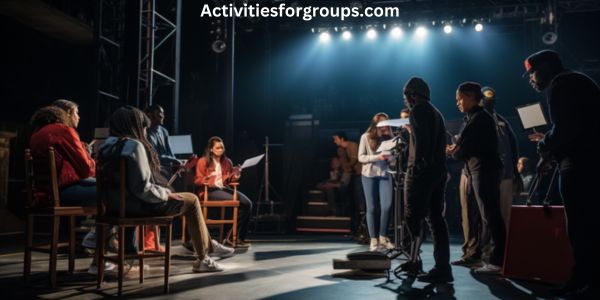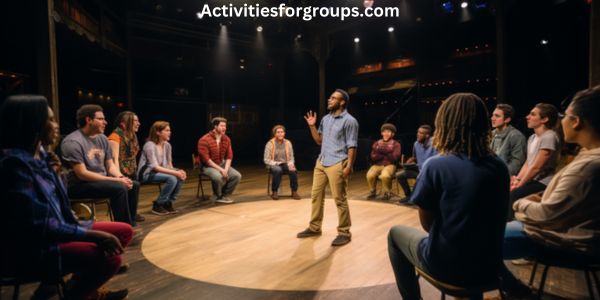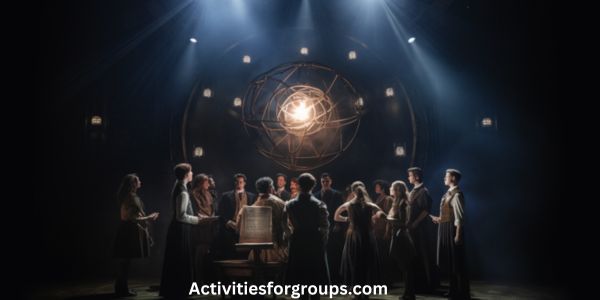Are you looking to organize group theater workshops in schools? It can seem daunting, but with the right planning and preparation, it can be a breeze!

Follow these steps to make sure your theater workshop is a success:
- Assess the school’s needs: Before diving into organizing the workshop, have a conversation with the school administration or teachers to understand their goals and expectations. Find out what specific areas they want to focus on, such as acting techniques, improvisation, or stagecraft.
- Find a venue: Identify a suitable space within the school where the workshop can take place. It could be a theater, a multipurpose room, or even a classroom with enough space for movement and activities.
- Recruit and train volunteers: Reach out to drama enthusiasts, theater professionals, or drama students who might be interested in volunteering for the workshop. Provide them with training and guidance on how to effectively facilitate the activities and engage the students.
- Outline the agenda: Develop a detailed plan for the workshop, including the activities, exercises, and games that will be used to teach the theater skills. Consider the age group of the students and tailor the agenda accordingly.
- Plan the logistics: Take care of the logistical aspects such as scheduling the workshop, arranging for necessary equipment and materials, and ensuring the safety of the participants. Communicate with the school staff to coordinate any additional requirements or support needed.
Let’s get started!
Assess the Needs of the School
Before organizing group theater workshops in schools, it’s important to assess the needs of the school to ensure you’re providing the best program. This should include gathering information from the school on their current educational objectives and understanding the level of engagement the students have with theater. It’s also beneficial to know the types of resources the school already has available to use, such as staff, equipment, and even prior experience running theater workshops. Knowing all this information will help you provide the most engaging and appropriate program for the students.
You can also use surveys to evaluate the needs of the school and the level of interest of the students in theater. This will provide helpful feedback on what kind of program would best meet the educational objectives of the school and be the most enjoyable for the students. Additionally, speaking to the teachers and administrators at the school will give you insight into what kind of theater program they envision and what kind of support they can provide.
Ultimately, assessing the needs of the school will help you create a group theater workshop that’s engaging, educational, and beneficial for the students. Gathering the necessary information and understanding the available resources is the first step to organizing a successful program.
Choose a Venue for the Workshop

Once you have assessed the needs of the school, you’ll need to choose a venue for the workshop. The venue you select should be large enough to accommodate the number of participants you plan to include in the workshop. Additionally, the space should be conducive to the activities you plan to do, such as acting exercises, games, and discussion.
When selecting a venue, consider any connecting curriculum you’ll need to include. For example, if you plan to use a specific book selection for your workshop, make sure the venue has enough space to accommodate everyone and the materials needed to explore it. You’ll also need to consider the acoustics of the space, to make sure everyone can hear each other and the sound of the performance.
Finally, you’ll need to ensure the safety of the attendees. Look for a space that’s well-lit and secure. It should be close enough to the school that it’s easy for students to get to and from the workshop. Make sure any props, furniture, or equipment you plan to use are safe and secure.
Organizing a group theater workshop in schools is a great way to engage students in the art of theater. Choosing the right venue is essential to providing an engaging and safe experience for the participants. With the right space, students can explore the world of theater in an environment that’s conducive to learning.
Recruit and Train Volunteers
To ensure your group theater workshop runs smoothly, you’ll need to recruit and train volunteers. This can be a daunting task, but it’s essential to the success of your workshop.
Start by creating incentives for volunteers to come on board. Think of ways to make it worth their while, such as offering free theater tickets or a certificate of appreciation at the end of the workshop. You can also try to find funding to cover the costs of any materials the volunteers may need.
Once you have recruits, you’ll need to start training them. Make sure they’ve a clear understanding of the expectations and objectives of the workshop. Provide them with handouts outlining the key points and any other information they might need. During the training, ask them to make suggestions on how they think the workshop should be run. This will ensure that the volunteers are comfortable with their roles and can help make the workshop a success.
Finally, be sure to have regular follow-up meetings with your volunteers. This is a great way to keep them motivated and to offer them support. Make sure you thank them for their time and effort and let them know that their contributions are valued.
With the right recruitment and training, you can make sure your group theater workshop is a success.
Outline the Workshop Agenda

Carefully outlining the workshop agenda is essential for a successful group theater workshop in schools. The agenda should include topics such as improvisation techniques and group dynamics, as well as exercises that focus on each. It’s important to break the workshop into manageable chunks and keep the agenda flexible, so that the group can explore different topics and activities.
When creating the agenda, it’s important to consider the length of the workshop, the needs of the group, and the goals of the workshop. It’s also important to keep the agenda simple and engaging, so that the group can be involved in the activities and have fun.
When creating the agenda, it’s also important to consider the age group of the participants and their prior experience with theater. For younger children, the activities should be simple and fun, while for older students, they should be more challenging. It’s also important to provide activities that allow the participants to explore different aspects of theater.
In addition, it’s important to plan for breaks during the workshop. Breaks are important for everyone to take a break and relax. Breaks should also be used to discuss progress or any issues that have arisen during the workshop.
Plan Logistics and Final Preparations
Once the workshop agenda is set, you’ll need to plan the logistics and make any final preparations for the group theater workshop in schools. To increase engagement and ensure everyone is on the same page, create an overview of what will be discussed and what materials will be needed. This will help you to better discuss the benefits of the workshop with both students and school administrators.
| Activity | Materials Needed |
|---|---|
| Brainstorming | Whiteboard, markers |
| Improvisation | Props, costumes |
| Character Development | Character worksheets |
| Rehearsal | Scripts, blocking notes |
| Final Showcase | Performance space, seating |
Before starting the workshop, provide a brief introduction to the group so they can get to know each other. Additionally, make sure to review the goals of the workshop, as well as any rules and regulations. Finally, explain the evaluation process and how it will be used to assess the success of the workshop. With these preparations in place, you are now ready to begin the group theater workshop!
Frequently Asked Questions [FAQs]
What Qualifications Should Volunteers Have?
Volunteers should have a background in theater and experience leading workshops. Background checks are important to ensure the safety of students.
What Age Group Should the Workshop Be Tailored For?
When considering the age group for your workshop, consider engagement strategies and group dynamics. Think about age-appropriate activities that will maximize engagement and ensure a productive environment.
What Safety Precautions Should Be Taken?
You should ensure role playing and professional training is provided to ensure safety. Always establish protocols, clear communication, and have an emergency plan in place.
What Equipment Is Necessary for the Workshop?
You’ll need basic theater equipment such as scripts, props, costumes, and makeup. Familiarize yourself with theater etiquette and the materials to use. Be sure to have a safe space for the workshop.
Is There a Budget for the Workshop?
Yes, a budget should be considered when organizing a group theater workshop. Group dynamics and instructor experience are key components to consider when allocating funds.
Conclusion
Organizing group theater workshops in schools takes planning and preparation, but the end result is sure to be rewarding. With the right resources and volunteers, a successful workshop can be created that meets the needs of the school.
By following the steps outlined above, you’ll be well on your way to setting up a successful theater workshop that will benefit everyone involved.




Leave a Reply